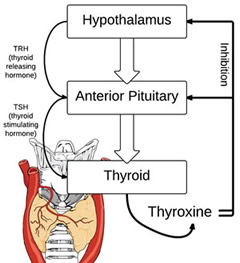What's Wrong with Timothy? - A Case Study on the Endocrine System
Part 1: As a Teenager.....
Timothy was always an active little boy, and was a great player for his Little League team at the age of 12. For the first year or so, Tim had no trouble catching balls and running bases. He was doing such a good job that he was even promoted to the next division. Unfortunately, this is also about the time that his mother started to notice that something wasn’t quite right with Timothy.
At age 14, Tim started to have trouble with his coordination and was slower in practice. His mother wasn’t sure if maybe he was just getting bored with playing. His coach had no choice but to place him on the bench, he just wasn’t keeping up.
He started to grow rapidly, and complained about pain in his joints. Family members just chalked it off to “growing pains.” Teachers observed that Tim seemed withdrawn, and even his grades began to slip. In junior high, many of the other boys were showing an interest in girls, but not Tim, he just became more introverted.
By the time Tim entered high school, he was very tall for his age. At 6’2”, Tim weighed 155 pounds and wore a size 13 shoes. Some of the kids teased him and called him “stringbean.” Even after Tim actively tried to put on weight and muscle mass by going to the gym after school, he just couldn’t seem to gain a pound. Tim’s grades were still not good, and he said he always felt anxious and jittery in school. Tim would often stay home because he felt sick to his stomach, though his mom thought that some of his symptoms might be due to being overwhelmed with his schoolwork. His mother finally decided to take Tim to the doctor to see if there was anything physically wrong with him.
Dr. Thalmus made some initial observations of Tim and asked about his symptoms. He decided to check Tim’s blood to see if his hormone levels were in the normal range. He first focused on the thyroid, since that is the gland often associated with metabolism.
1. List Tim'’s symptoms and identify the organ system (or specific organ) associated with those symptoms. (Your may need to reference other materials to identify associated organs and systems.)
2. Where is the thyroid? What is the relationship between metabolism and the thyroid?
3. What is hyperthyroidism? What symptoms of Timothy might suggest he has this disorder?
4. The doctor also decides to check on Timothy’s cortisol levels. What gland(s) produce cortisol?
Part 2: The Test Results
The doctor returned to show Timothy the results of his tests. Hormone levels were checked for Thyroid Stimulating Hormone (TSH), Thyroxine (T4) and Tri-iodothyronine (T3).
| TSH (mIU/L) | T3 (ng/ml) | T4 (ug/dl) | Testosterone | Cortisol (ug/dl) | |
| Normal Low | 0.4 | 0.8 | 4.5 | 350 | 3 |
| Normal High | 4.2 | 2.0 | 12.5 | 1200 | 10 |
| Timothy | 0.38 | 2.6 | 13.2 | 320 | 9.8 |
Dr. Thalmus shook his head at the results, clearly he was puzzled by some of the numbers. It looks like you may have a condition called hyperthyroidism. We are going to need to get your TSH numbers higher to correct the problem.
Timothy looked at the chart and remembered something his biology teacher had told him. “Doesn’t the word ‘hyper’ mean ‘more’. Why would you want to make the TSH numbers higher if I already have too high levels of T3 and T4.”Dr. Thalmus seemed impressed that he knew this and attempted to explain. “The whole system is part of a feedback loop with your pituitary gland.” The doctor sketched a quick diagram on the whiteboard in his office. “First, your pituitary senses the level of thyroid hormone in your blood, if the amount is low, then it releases Thyroid Stimulating Hormone to stimulate the thyroid to release more thyroid hormone. Basically, the pituitary is attempting to return the system to a normal functioning.
Timothy looked a the diagram and nodded while the doctor continued, “If your thyroid is overactive and producing too much hormone, then the pituitary senses this and slows or shuts down the production of TSH.”
The doctor started writing a prescription. “This drug will suppress your thyroid and hopefully, your pituitary will notice the levels have dropped and will start producing more TSH to get you into the normal range.”

5. Which hormones would be considered in the high range? What gland produces these hormones?
Which hormones would be considered low?
What gland produces these hormones?
6. The doctor didn’t mention cortisol, but it should also follow a similar feedback loop. Sketch a feedback loop that includes the hypothalamus, pituitary, adrenal glands, and cortisol.
Part 3: Symptoms Return
Timothy filled his prescription and for several years, his symptoms were alleviated. When he was 28 years old, two years after getting married, he started noticing other problems. Anxiety levels were extreme and he had gained so much weight he was almost 250 pounds. His wife wanted to have children, but she had not yet gotten pregnant. Tim wondered if maybe his medication needed adjustment, so he returned to Dr. Thalmus.
Dr. Thalmus also noted that Timothy had very sparse body hair, so he also checked Tim’s testosterone levels and ran a battery of tests to see his other hormone levels. When the results came in, Dr. Thalmus had some frightening news for Timothy.
“Your hormone levels are all over the place,” He said. “Levels of testosterone are extremely low.. Your thyroid hormones are borderline low, but that could be due to medication. Your cortisol levels are off the chart though. This doesn’t look like it’s just a problem with your thyroid. I want to check your pituitary gland.”
Timothy frowned. “Isn’t that in my brain?” Dr. Thalmus nodded. “A simple MRI should tell us if there is anything abnormal.”
The results of Timothy’s MRI showed a mass on his pituitary gland and no major problems with the thyroid. Could Dr. Thalmus have gotten the diagnosis wrong years ago? The new symptoms all indicated that a tumor had put pressure on the pituitary and disrupted its functions. Tim was referred to a hospital in St. Louis, where they used radiation to destroy the pituitary and any tumor associated with it.
7. The pituitary gland is called the “master gland.” What other endocrine glands would have been affected by its malfunction?
8. Tim will need to take several hormone replacements because he no longer has a functioning pituitary gland. Which hormones should the doctor prescribe to Tim?
9. Dr. Thalmus suggested that Tim take a regimen of Human Chorionic Gonadatropin (HCG), which has the same effects as Luteinizing Hormone (LH) Why would he recommend this? What problem will could this potentially solve for Tim?
10. Do you think the original diagnosis was wrong? Why or why not?
Anatomy Unit on the Endocrine System
Feedback Loops Worksheet or Slides Version
Endocrine System Concept Map


